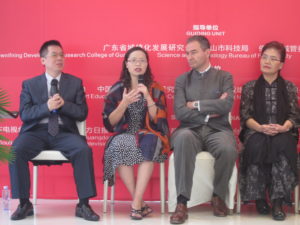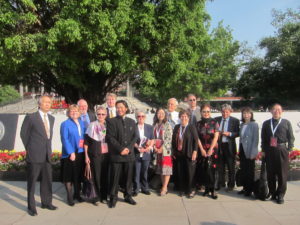Alumna Spotlight: Dr. YiChien Cooper
FSU alumna Dr. YiChien Cooper recently became acting president of the World Chinese Art Education Association. Dr. Cooper was kind enough to sit down with us and answer some questions about her new position and her previous experiences with art education.
Did you ever imagine obtaining the position that you have today?
I have to say that I never really thought I would be in the position of acting president for the World Chinese Art Education Association. When I finished my PhD I planned to solely pursue an academic career and figured I would be part of several professional societies, but not the head of one.
What opportunities did you pursue that led to your current occupation?
In 2001, I began building my career as tenure track professor at Grand Valley State University, Michigan, where I helped to develop its art education program and worked on the state accreditation program. I was able to apply my knowledge in program evaluation to revision and restructure the art education program. I also had opportunities working with local non-profits organizations such as YMCA and Public Television Station to advocate art educations beyond classrooms.
I enjoy bringing people together through arts. Soon after moving to Richland, WA., I noticed that the local Chinese Community is shy to connect to outside communities. Therefore, in the past 5 years, with the support of Richland Library, I have brought concerts and curated annual arts and cultural exhibitions to Richland Library. Through the process, not only the Chinese Community is able to share the beauty and history of their heritage, the local community members are able to understand and appreciate Chinese culture. Most importantly, the Chinese Community has now built strong friendship with the Taipei Economic and Cultural Office in Seattle that provides more arts and cultures opportunities in town.
How did you become involved with the World Chinese Art Education Association initially? Why were you attracted to this organization?
Once I moved out west, I found Washington State University Tri-Cities Campus was uninterested in forming an art education program, so I began to pursue independent research and have been able to attend both national and international conferences based on my research. My breakthrough with the World Chinese Art Education Association happened when I received a phone call in 2010 from my mentor, Dr. Ann Kuo, who asked if I was available to assist in organizing the second World Chinese Art Education Association in Nan-Jing, China. I went as a presenter, an observer, and ended up a problem solver and a simultaneous translator on stage. During that trip, I have learned valuable firsthand experience from Dr. Kuo, who included me in many important meetings and decision making process. After that, I took a more important role as the International Affair Coordinator for the association, overseeing the selecting process of keynote speakers and conference arrangement for 2012Hangzhou Conference. In December 2012, upon Dr. Ann Kuo’s request, I took over the task of organizing 2013 conference in Guangzhou with the help from the host, Guangzhou Arts Institute. During the conference, I accepted the position as the Acting President as well as the International Affair Coordinator offered by the core committee.

Yichien Cooper addressing at the International Seminar of Fushan Design Summit at Guangzhou to promote media arts, 2013
What unique abilities/traits do you possess that gave you an advantage when pursuing this position?
I view myself as the bridge: my Chinese colleagues and international scholars; arts education theories from East to West. My training in philosophy inquiries and museum administrations allows me to have clear vision and the means to complete the task. The more I am involved, the more I realize how important to be able to act as an ambassador, providing opportunities for both sides and grow together as a global community. Another important trait I have that allowed me to take on the role of acting president is the will to drive my work and responsibilities to successful completion. I have always pushed myself and those around me to achieve excellent. I also believe integrity and transparency are keys to build trust among diverse people. I cannot complete the task along. In 2013 along, I organized not only the World Chinese Art Education Association, but also a summit in Guangzhou, and a conference in Malaysia. With trust and support, I have made many friendships along the way; and together, we get the job done. This is very important when one needs to organize and plan long-distance.
Did any particular experience in the FSU program give you provide you with the tools you needed to lead you to this career path?

Yichien Cooper with the international scholars and Deans from Guangzhou Arts Institute at Guangzhou Arts Institute, 2013.
I found that supervising pre-service students in the field and being a teaching assistant (TA) were some of the most important things since I was able to see firsthand how to apply theory into day-to-day classroom practices. Another valuable experience was being trained in the museum studies program; I was able to work at museums in town and overseas to learn a lot of aspects of running a museum, from docent to curatorial and administrative to budgeting. I remember vividly we visited many arts outreach organizations near Tallahassee: Living history museums, zoos, art museums, community centers, galleries, etc. I feel that many of these aspects are extremely useful and practical in most everything I do. My dissertation on qualifications of an art museum educator allows me to look into the field of program evaluation. Through research, I was able to look at the structure of any given program a different light. At FSU, Dr. Anderson influenced my definition of art education tremendously. The seeds of Art for Life were introduced and have been shaping my career: the idea of linking and advocating arts beyond classrooms walls, give me motivations to find ways to question, research, and actively connect arts to people’s life. This is a driving force for me to become a City Arts Commissioner at the City of Richland, advocating and installing art in the community.
What was the most important/influential thing that you learned while in school?
I was attracted by the array of arts education program (Arts admirations, art therapy, and museum studies) Florida State offers. The diverse aspects have enriched my knowledge and applications in the arts. Dr. Anderson, Dr. McRorie, and Dr. Villeneuve (She was my professor for my Masters in University of Kansas. She was also my mentor during my museum interns at Spencer Museum of Art) encouraged and trained me how to do public speech and effective presentations. In addition, I was deeply influenced by late Dr. Jehanne Teilhet-Fisk. It was under her guidance I began my interests in evaluating existing k-12 curricula on teaching multiculturalism. These professors helped me realize that it is important to learn the skills of research, but most importantly, one needs to be passionate about sharing the knowledge.
In pursuit of your current position, were there any major setbacks that you had to overcome?
The largest obstacle I had to overcome was a lack of actual art education division from my institution. Being an adjunct professor, I had limited support and recognition from my university. However, I believe that everything has a silver lining. I have been blessed to have opportunity to teach integrating arts course for in-service classroom teachers and art history course for general students. These courses allow me to link arts with other disciplines, make me strive to promote the role of arts. I am also very fortunate to have friends in the department trusting me to ‘tweak’ my students and become critical thinkers in the arts curriculum design. In the past 7 years, I have also taught children art at home. I am lucky to have a group of young students eager to be creative and imaginative. Their works inspire my teaching and motivate me to conduct research. It is somewhat ironic to say that because of the lack of a position in the academia, I am able to pursue my current role independently.
Do you have any advice for students or professionals who might desire to follow in your footsteps?
Although most people and organizations want/need to be successful, sometimes it takes someone to be extremely persuasive to make funding agents and politicians to see the importance. I would say to persevere when doing something that you feel is truly important. It is also very important to be a team player and believe in people.
What do you hope to do after assuming the position as the acting President of the World Chinese Art Education Association? Any future plans/goals?
The thing I cherish the most is the friendships I made along the way. I am touched by the trust my Chinese colleague gave me, scholars’ unconditional support, and those who accept me as who I am not what my academic title is. As the Acting President of the World Chinese Art Education Association I hope to lead the organization to be even more inclusive, stressing the need to close the gap between theories and practices (higher ed. vs. k-12 settings), and introducing various fields that related to arts education. I have successfully installed the aspect of museum education in 2012 Hangzhou Conference, and it has brought more attention in 2013 conference. I hope to expand the organization to be inclusive of even more art related fields before my term is over in 2017. I also intend to establish affiliations with sister organizations. In 2012 I planned the graduate students forum, in 2013 master workshops were implemented, which I hope to continue in 2015 to find ways to cultivate young scholars. After all, they will be the ones shaping the future of Arts Education in China. Providing a platform for art educators to share and learn from each other is my passion.
I have dreams, such as providing more opportunities for scholars from China to the United States. I believe this platform is not limited to organizing conferences or establishing exchange workshops. I am currently working towards completing several Chinese books that hope to act as a mean to strengthen arts education community. In the meantime, my role as the Arts Commissioner at the City of Richland will allow me to provide meaningful connections through arts events, public arts installations, art education programs, and artist opportunities to my community. Of course I hope most of all to accomplish even more than I have currently planned.
We are grateful to Dr. YiChien Cooper for her time and look forward to hearing more of her accomplishments in the future!